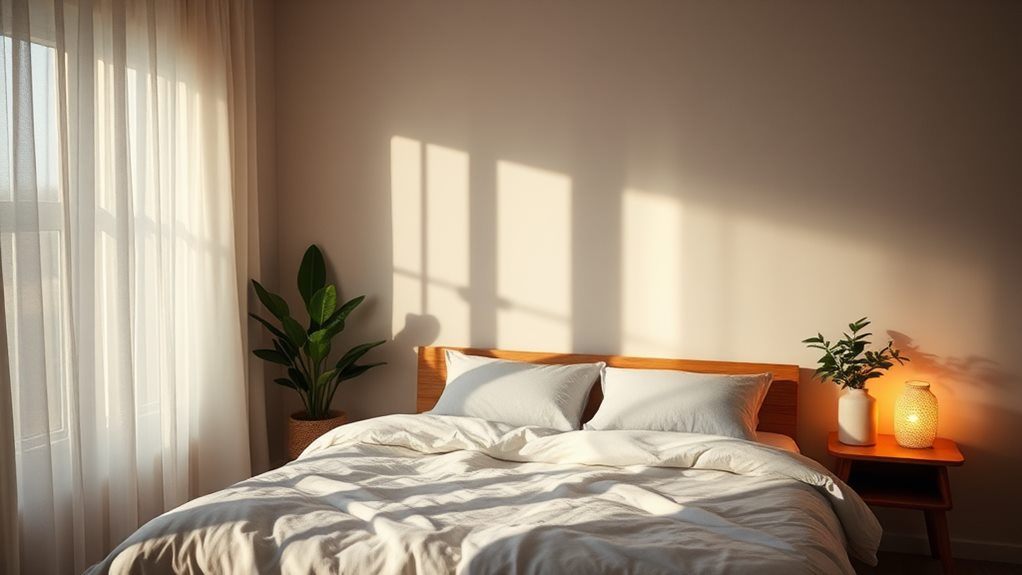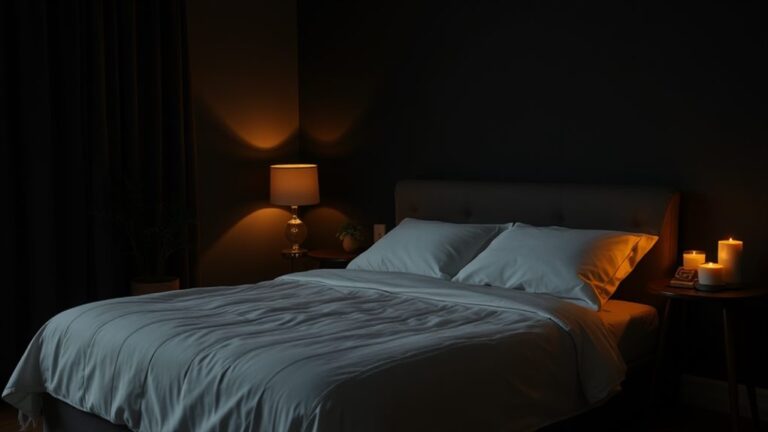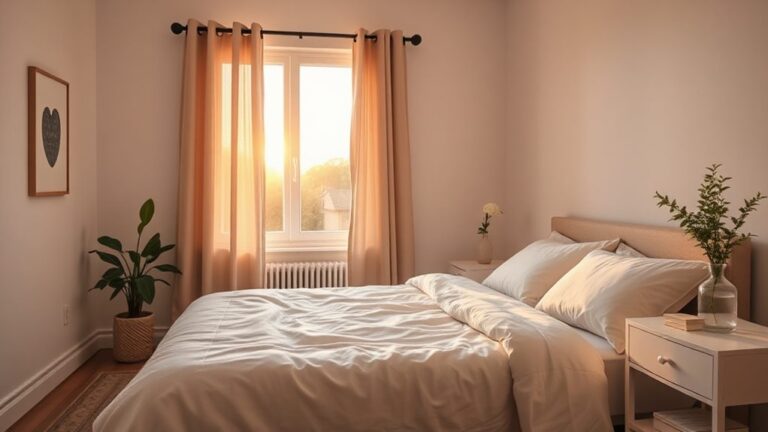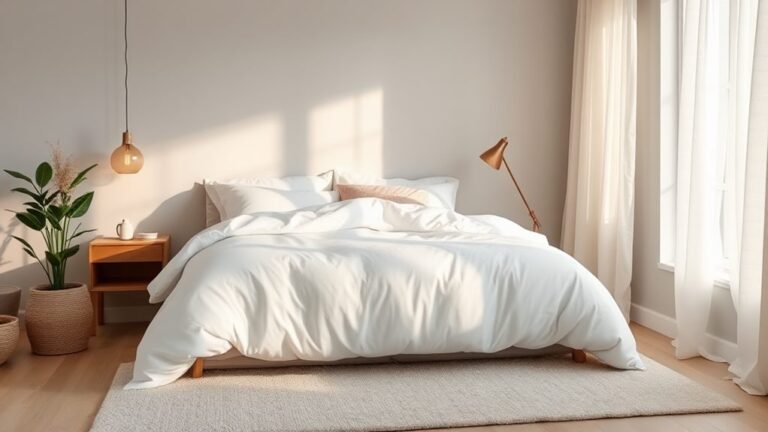You can improve your sleep quality by incorporating seven simple evening habits into your routine. Limit your screen time before bed to avoid suppressing melatonin production, and eat a light evening meal to aid digestion. Practice gentle stretching exercises to relax your muscles, and create a calming bedtime routine to signal to your brain that it's time to wind down. You can also read a book or listen to soothing music, meditate to clear your mind, and prepare a dark sleep environment to promote better sleep. By starting with these habits, you'll be on your way to discovering a restful night's sleep.
Nightcap Notes
- Limit screen time an hour before bedtime to avoid blue light emission that suppresses melatonin production.
- Eat a light evening meal 2-3 hours before bedtime, including lean protein, complex carbohydrates, and steamed vegetables.
- Incorporate gentle stretching exercises into your evening routine to release tension and promote relaxation.
- Establish a consistent bedtime routine, such as reading or listening to calming music, to signal to your brain that it's time to sleep.
- Create a sleep-conducive environment by making your bedroom dark, quiet, and cool, and removing electronic devices that emit light.
Limit Screen Time Before Bed
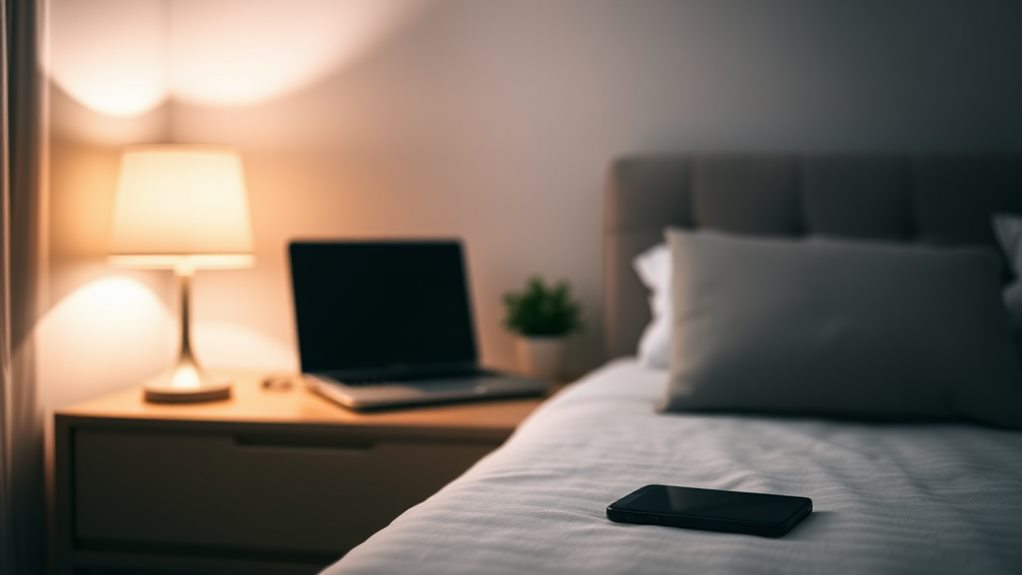
An hour before bedtime, you should limit your exposure to screens. This includes phones, tablets, laptops, and TVs.
You're probably used to scrolling through your phone or watching a show before bed, but the blue light emitted by these devices can suppress melatonin production, making it harder for you to fall asleep.
A clutter-free bedroom is also essential for better sleep quality, as it promotes relaxation and reduces stress bedroom organization tips.
By keeping your bedroom tidy and organized, you can create a sleep-conducive environment that helps you wind down and prepare for sleep.
When you're exposed to screens, your brain thinks it's still daytime, and it doesn't start producing melatonin, the sleep hormone.
By limiting screen time, you're allowing your brain to wind down and prepare for sleep.
You can use this time to relax and unwind in other ways, like reading a book, taking a warm bath, or practicing gentle stretches.
You can also use blue light filtering glasses or apps that filter out blue light from screens.
This can help minimize the negative effects of screen time on your sleep.
By making this small change, you can improve the quality of your sleep and wake up feeling more rested and refreshed.
Eat a Light Evening Meal
While a satisfying dinner can be a great way to unwind after a long day, eating a heavy evening meal can actually interfere with your sleep. When you eat a large meal close to bedtime, your body is working hard to digest the food, making it harder for you to fall asleep. You can still enjoy a delicious evening meal, but make sure it's light and balanced.
Here's a rough guide to planning a sleep-friendly evening meal:
| Food Type | Examples |
|---|---|
| Lean protein | Grilled chicken, fish, or tofu |
| Complex carbohydrates | Brown rice, whole wheat bread, or quinoa |
| Steamed vegetables | Broccoli, carrots, or green beans |
| Fresh fruit | A small apple or banana |
Aim to finish eating at least 2-3 hours before bedtime to give your body time to digest. A light evening meal will help you relax and prepare your body for a restful night's sleep. By making a few simple changes to your evening eating habits, you can improve the quality of your sleep and wake up feeling refreshed and energized.
Practice Gentle Stretching Exercises
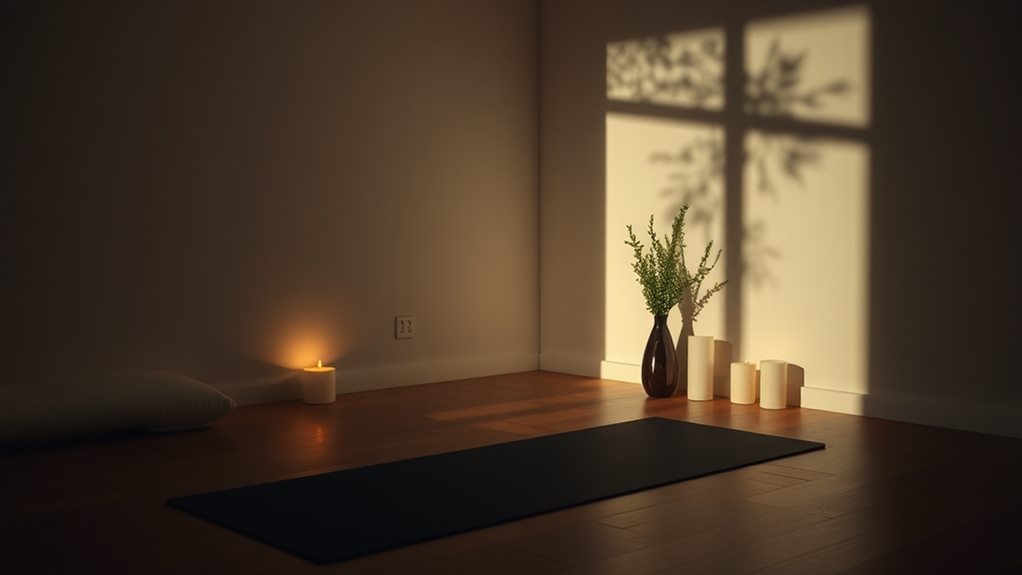
Gentle stretching exercises can be a powerful sleep-promoting tool when incorporated into your evening routine.
By loosening up your muscles, you're helping your body relax and unwind after a long day. As you stretch, focus on releasing any tension you've built up, starting with your toes and working your way up to your head.
Take deep breaths, inhaling as you lengthen your muscles and exhaling as you release. For an added relaxation boost, consider sipping on a soothing herbal tea, such as those found in Sip to Sleep recipes, to calm your mind and body.
You can also try drinking a warm cup of tea while you stretch to enhance the relaxing effects.
You don't need to be a yoga expert to reap the benefits of gentle stretching.
Simple movements like toe curls, neck stretches, and shoulder rolls can make a big difference. As you stretch, pay attention to any areas of tightness or discomfort.
If you notice your hips or lower back are particularly stiff, spend a little extra time working on those areas.
By taking a few minutes each evening to stretch, you'll be improving your flexibility, reducing muscle strain, and setting yourself up for a restful night's sleep.
Remember to keep your movements slow and controlled, as jerky or bouncy movements can actually stimulate your body instead of calming it down.
Create a Relaxing Bedtime Routine
Many people overlook the importance of a calming pre-sleep routine, but it's a crucial step in preparing your mind and body for a restful night's sleep.
By establishing a consistent bedtime routine, you signal to your brain that it's time to wind down and relax. This helps regulate your body's internal clock and improves the quality of your sleep.
Incorporating sleep-inducing smoothies into your bedtime routine can also promote relaxation and prepare your body for sleep. Try sipping on a smoothie made with calming ingredients, such as those found in Sip to Sleep recipes, to help your mind and body unwind.
To create a relaxing bedtime routine, start by setting a specific bedtime and sticking to it, even on weekends.
Develop a calming pre-sleep activity, such as taking a warm bath, practicing gentle stretches, or enjoying a soothing cup of herbal tea. Dim the lights and reduce noise levels to create a peaceful atmosphere.
Avoid stimulating activities like watching TV or scrolling through your phone, as they can interfere with your sleep.
By incorporating these habits into your daily routine, you'll be able to relax and unwind, making it easier to fall asleep and stay asleep throughout the night.
A consistent bedtime routine helps you establish healthy sleep habits, leading to better rest and relaxation.
Read a Book or Listen Music
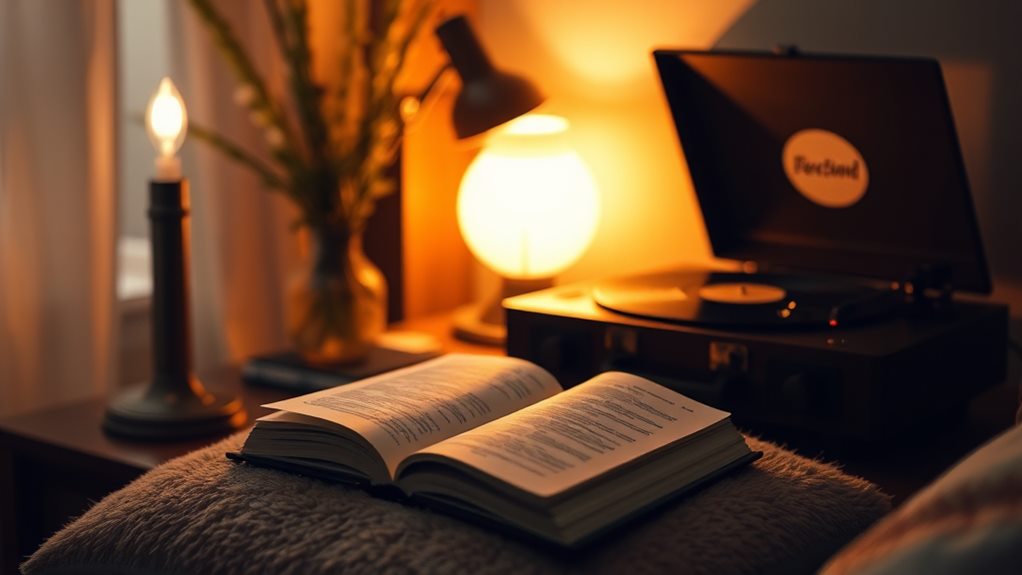
You can further enhance your bedtime routine by incorporating calming activities that distract your mind from the stresses of the day and calm your body.
Reading a book or listening to music are excellent choices. When you immerse yourself in a good book, you'll focus on the story and characters, letting go of your worries and concerns. Opt for a physical book or an e-reader with a blue light filter to avoid disrupting your sleep.
Listening to music can be equally effective. Choose calming genres like classical, jazz, or nature sounds, and keep the volume low. Avoid stimulating music that might energize you.
Create a playlist or find a radio station that helps you unwind. As you listen, feel your muscles relax, and your mind calm. Both reading and listening to music can help slow down your heart rate, lower your blood pressure, and prepare your body for a restful night's sleep.
Meditate and Clear Your Mind
As nighttime approaches, meditation becomes an essential activity to calm your mind and body.
You've spent the day juggling tasks, solving problems, and interacting with people, and now it's time to unwind. Meditation helps you quiet your mind, letting go of worries and stress.
Find a quiet spot, sit comfortably, and close your eyes. Focus on your breath, feel the air entering and leaving your nostrils, and let your thoughts drift away.
As you meditate, your body relaxes, and your mind clears. You'll feel your muscles release tension, and your thoughts become less cluttered.
Regular meditation practice can also improve your sleep quality by reducing stress and anxiety. Start with short sessions, like 10-15 minutes, and gradually increase the duration as you become more comfortable with the practice.
You can use guided meditation apps or simply focus on your breath. By incorporating meditation into your evening routine, you'll be better equipped to handle the challenges of the day and prepare your mind and body for a restful night's sleep.
Prepare a Dark Sleep Environment
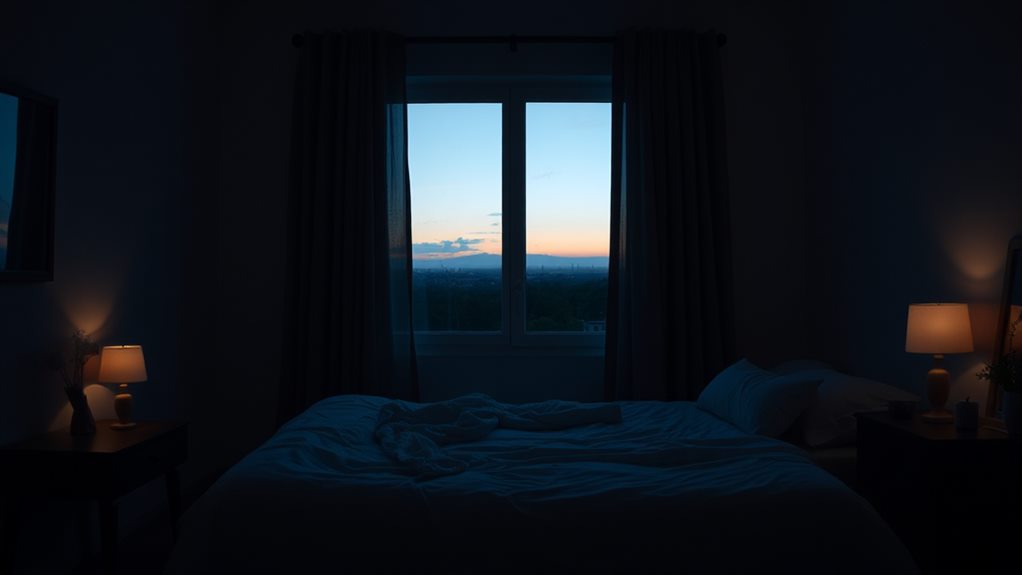
Darkness is a crucial element in creating a sleep-conducive environment. You need to make your bedroom a sleep sanctuary, and darkness is essential for your body to produce melatonin, the hormone that regulates sleep.
To achieve this, you'll want to guarantee your bedroom is as dark as possible. You can start by using blackout curtains or shades to block out any light from the windows.
If you don't have these, you can use a sleep mask to cover your eyes. Remove any electronic devices that emit light, such as TVs, computers, and phones, from the bedroom.
If you have a clock radio or alarm clock with a bright display, consider replacing it with a clock that has a dim or red light. By creating a dark sleep environment, you're sending a signal to your brain that it's time to sleep.
This simple habit can have a significant impact on the quality of your sleep, helping you fall asleep faster and sleep more soundly through the night.
Frequently Asked Questions
What if I Work Non-Traditional Hours, How Can I Adjust These Habits?
You're working non-traditional hours, so you'll need to adjust your habits to fit your unique schedule.
Start by identifying your sleep window – the times of day when your body naturally wants to sleep.
Then, work backwards to establish a pre-sleep routine that signals to your brain that it's time to wind down.
You can still use the same habits, but you'll need to time-shift them to fit your non-traditional work hours.
Do Evening Habits Change for Different Age Groups or Demographics?
You'll find it intriguing that 62% of adults aged 65 and older prioritize sleep as a crucial aspect of healthy living.
As you consider whether evening habits change for different age groups or demographics, you realize that they indeed do. For instance, older adults may benefit from relaxing evening routines that start earlier, while young adults might need to wind down with calming activities after a long day of work or school.
Can Pets in the Bedroom Disrupt Sleep Quality?
You're probably wondering if having your furry friend in the bedroom disrupts your sleep quality.
Well, you're not alone. Research shows that pets can indeed affect your sleep. You might wake up to their movements or be disturbed by their snores.
However, it's not all bad news – having a pet in bed can also provide comfort and stress relief, helping you fall asleep faster.
It's all about finding a balance that works for you.
How Long Does It Take to Notice Improvements in Sleep Quality?
Wow, you're expecting a magical sleep transformation overnight? Sorry, buddy, it doesn't work that way.
It takes time to notice improvements in sleep quality. You'll start to feel the difference in about 2-4 weeks, but don't worry, it's worth the wait.
As you stick to your new habits, your body will thank you. You'll be sleeping like a baby in no time, and those pesky dark circles will become a thing of the past.
Can Certain Medications Interfere With Establishing a Bedtime Routine?
You're wondering if certain medications can interfere with establishing a bedtime routine.
Actually, some prescription and over-the-counter meds can disrupt your routine, making it harder to wind down at night.
Stimulants, sedatives, and antidepressants can affect your sleep patterns.
You'll want to talk to your doctor about potential medication interactions and adjust your routine accordingly.
This way, you can establish a consistent bedtime routine that works for you, not against you.
Conclusion
You've got the evening habits down, now it's time to reap the benefits. By incorporating these simple routines into your daily life, you'll be sleeping like a baby in no time. Did you know that a staggering 30% of the general population experiences sleep disruptions, which can lead to serious health issues? By prioritizing your sleep, you're not only improving your quality of life, but also reducing your risk of chronic diseases. Make the change tonight.

